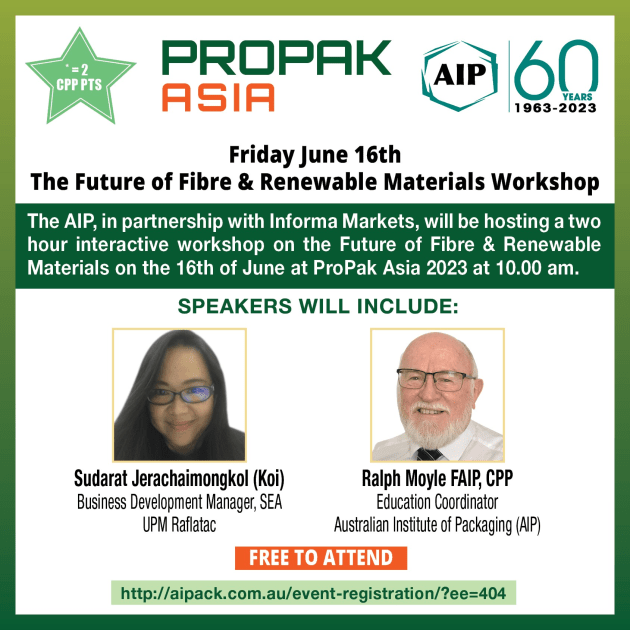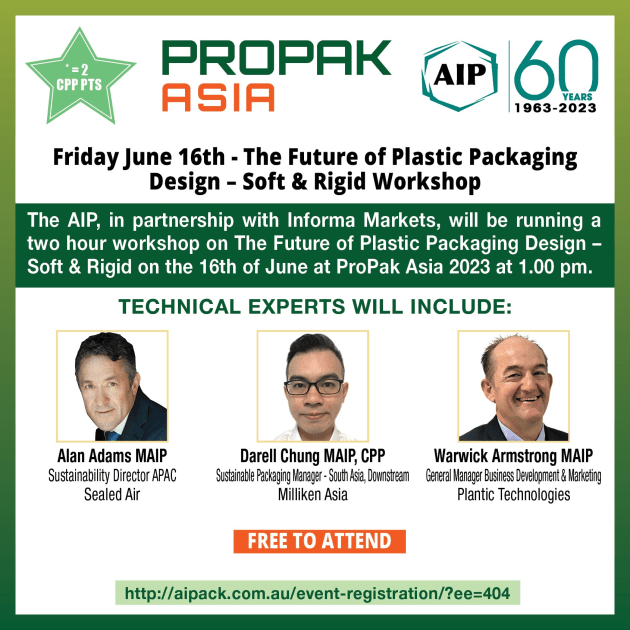The Australian Institute of Packaging (AIP), in partnership with Informa Markets, will be hosting not one, but two workshops on 16 June at ProPak Asia 2023.
All of industry is invited to attend the free interactive workshops, which will cover the topics of ‘The Future of Fibre & Renewable Materials’; and ‘The Future of Flexible Packaging’.
The Future of Fibre & Renewable Materials
This two-hour workshop, which runs at 10am, will explore the pros and cons of fibre or paper alternatives, and what to consider in reviewing packaging options.

Speakers will include: Sudarat Jerachaimongkol, business development manager at UPM Raflatac; and Ralph Moyle, education coordinator at the AIP.
“The impact of plastic on the environment has become a pressing global issue, and the packaging industry has been slow in addressing community concerns,” said Nerida Kelton, executive director, AIP.
“This growing concern has seen companies and retailers reacting, perhaps overreacting to consumers’ attitudes, and rapidly seeking to replace plastic packaging with paper-fibre-based alternatives.
“Paper-based packaging is typically thought to be a sustainable alternative to plastic, since it is understood to be recyclable, biodegradable and compostable.
“But, does paper-based packaging, particularly for food, outperform plastic in terms of protection, functionality, cost-effectiveness, durability, and even from a sustainability perspective?”
Along with answering Kelton’s question, the topics to be discussed in this workshop include:
- Design factors for packaging selection;
- Understanding properties of paper, paperboard and fibre packaging;
- Recyclability issues;
- Compostability and PFAS;
- Innovations in paper and fibre packaging;
- Fibre-based labels and new innovations in adhesives and labels;
- Best practice examples of award-winning packaging designs in fibre and renewable materials;
- UPM Raflatac in-brief and commitment toward the sustainability, such as 100 per cent certified papers by 2030;
- UPM’s innovation and sustainable product portfolios, such as RAFNXT+ – the world’s first label material verified by the Carbon Trust and Carbon Neutral, and Forest Film – a replacement for virgin fossil-based film material with renewable wood-based one; and
- Award-winning packaging design with Forest Film.
The Future of Plastic Packaging Design – Soft & Rigid
This two-hour workshop, which runs at 1pm, will cover how, with global and regional regulations, extended producer responsibility programs, taxes and levies, plastics pacts being introduced across the world, now is the time for packaging designers, engineers and technologists to rethink the way they design their plastics packaging.

“Packaging needs to meet the 2025 Plastics and Waste Targets, the global and regional Waste Directives, and be redesigning to ensure that it is lightweight, incorporate recycled content wherever possible, have a lower environmental footprint, and improve the lifecycle of the plastics to ensure recyclability and support of circular design,” Kelton said.
“Improved design at the start will ensure that we keep quality feedstock out of landfill and dump sites, minimise litter, and improve the circular economy.”
Technical experts will include: Alan Adams, sustainability director APAC, SEE; Darell Chung, sustainable packaging manager – South Asia, Downstream, Milliken Asia; and Warwick Armstrong, general manager Business Development and Marketing, Plantic Technologies.
Topics include:
The current State of the Industry
- Packaging Regulations Globally & Locally
- Plastics Waste Directives
- Extended Producer Responsibility Programs
- Container Deposit Schemes
- Closed Loop Collection Programs
Marketing brands
- How do we balance operational efficiency and brand owner/marketing needs?
- Glossy and bright marketable or plain and simple sustainable
Design guidance, pack design whole of life, product protection
- Fit for Purpose and functional packaging vs sustainable and recyclable packaging. How do we get the balance right? What are the tradeoffs?
- Packaging Waste vs Food Waste: A balanced discussion. What happens if there are unintended consequences?
- Latest developments Flexibles/Rigids, especially how they can meet the regulation changes, while offering a great packaging experience
- How to incorporate Recycled Content into products
- How to lightweight
- How to ensure that your packaging is recyclable
- Award Winning PIDA and WorldStar Best Practice Examples
Circularity/End of life
- End of life options - the pros and cons
- Why is circularity so important to plastics
- How do we close the loop of circular plastics, what's missing
Technologies shaping the future of the plastics industry
- New plastics materials
- Food Grade Recycled Content advancements
- What is Advanced & Chemical recycling and what is the value
- Digital printing
- Designing for recovery and recyclability
- Award Winning PIDA and WorldStar Best Practice Examples
Transparency/connectedness
- Engaging stakeholders, providing more transparency is a global social trend
- What does the plastics industry need to do to stay relevant, be empowered and embraced in society
- Maturity around sustainability claims and real environmental impacts
To book for one or both of the workshops, click here. All attendees will attain two CPD points towards the global Certificate Packaging Professional Designation.






